
Basil I biography
Date of birth : -
Date of death : -
Birthplace : Byzantine Empire
Nationality : Macedonian
Category : Historian personalities
Last modified : 2011-01-13
Credited as : Emperor of Byzantine, ,
The Byzantine emperor Basil I , (ca. 812-886), also known as Basil I the Macedonian, ruled from 867 to 886. Despite his unsavory rise to power, he was a gifted statesman who gave the empire new vigor and began its most durable dynasty.
Of obscure Armenian parentage, Basil was born in Thrace. According to one tradition, he was carried off into captivity by the Bulgars while an infant; escaping in his 20s, he sought his fortune in Constantinople and took service with a kinsman of the Caesar Bardas, uncle and guiding influence of Emperor Michael III. About 858 Basil attracted the attention of the Emperor through his great physical strength and his way with horses. He rapidly rose to high ranks, became Michael's boon companion, and in an arrangement of convenience married the Emperor's mistress.
Basil's influence grew, and his ambition was kindled. In May 866 Michael proclaimed Basil his co-emperor. Allegedly because of Michael's incapacity but apparently more out of fear of his whims, Basil murdered his benefactor on Sept. 24, 867, and seized the throne. He also deposed the great patriarch Photius, who was then embroiled in a struggle with the papacy which deeply split Church sentiments in the Byzantine Empire.
For all his ruthless opportunism and brutality, Basil displayed genuine ability and a lofty sense of his office. Though he replaced Photius, he abided by Photius's policies of Eastern Church independence from Rome and of the Byzantine orientation of the newly converted Bulgarian Church. He later reconciled himself with Photius and restored him in the patriarchate in 877. Active as builder and patron, Basil scored his greatest domestic achievement by initiating a reform of the legal system. This grand project was not completed by Basil, but it was taken up and realized by his son and successor, Leo VI. Basil's legal work opened a brilliant new phase in the Byzantine extension of the living Roman law.
Basil's reign was active militarily. In the 870s his forces broke the heretical sect of the Paulicians, whose strongholds had weakened the eastern frontiers. His armies also pushed successfully against the Arabs, beginning the great momentum that Byzantium would develop in territorial reconquest in the next century. Basil's fleet reestablished Byzantine authority in Dalmatia, and he was the first emperor in perhaps 2 centuries to reassert Byzantine interest in Italy. His dispatch of the general Nicephorus Phocas (the Elder) to Italy inaugurated a new era of Byzantine recovery in the peninsula's southern territories.
Determined to establish his family on the throne, Basil made his three eldest sons his co-emperors. But in 879 Constantine, the eldest and Basil's favorite, died, and Basil was left emotionally shattered and mentally unhinged. Increasingly manipulated by Photius and alienated from his heir, Leo, Basil died on Aug. 29, 886, reportedly of a hunting accident.
The only full-length study of Basil I is by Albert Vogt in French. Vogt wrote the account of Basil in The Cambridge Medieval History, vol. 4 (1923). See also George Ostrogorsky, History of the Byzantine State (1940; trans. 1956; rev. ed. 1969); The Cambridge Medieval History, vol. 4 (2d ed. 1966), pt. 1, edited by J. M. Hussey; and Romilly Jenkins, Byzantium: The Imperial Centuries, A.D. 610-1071 (1966).
















